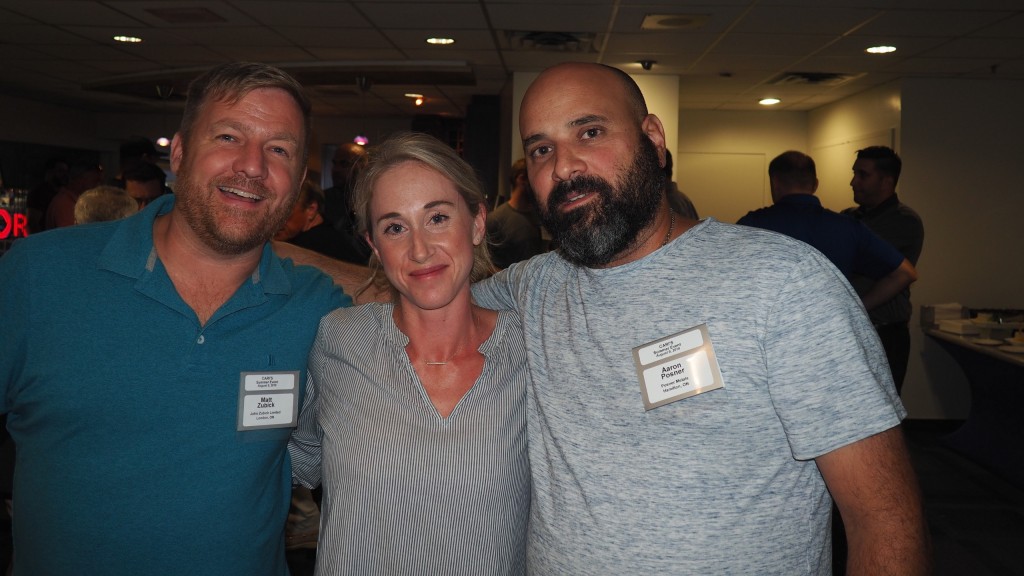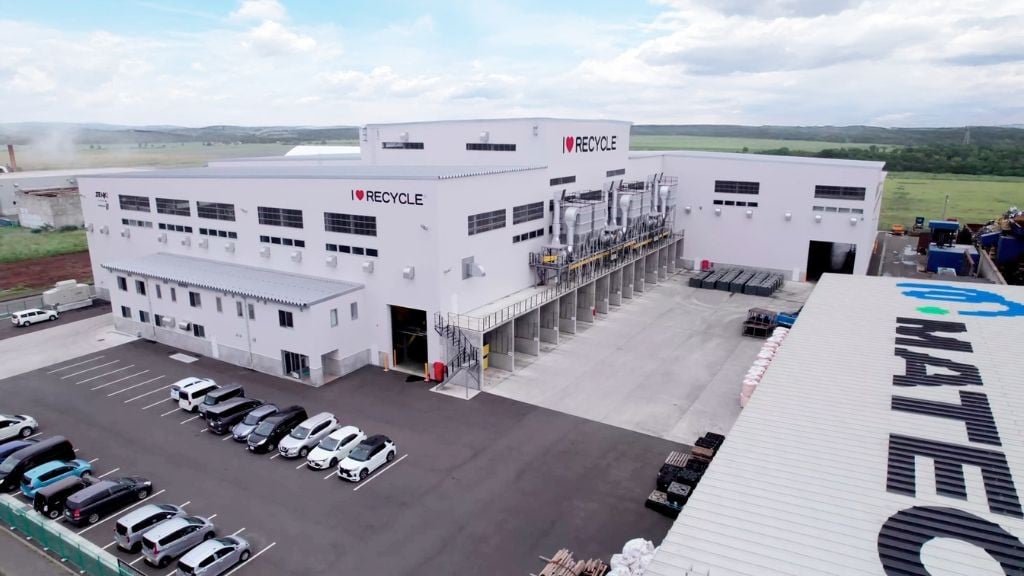Matt Zubick – CARI’s newly appointed chair – is focused on helping members navigate the transition back to domestic self-sufficiency
Advancing the home grown solution

Matt Zubick was appointed as the new Canadian Association of Recycling Industries (CARI) Chair at this year's Annual Convention, held in Niagara Falls, Ontario, in June. Zubick has been in the scrap business his entire working life and is currently manager at London, Ontario-based John Zubick Scrap Metals Ltd., started by his grandfather after he served in the Canadian Navy during the Second World War.
"I decided to go into the family business after graduation, in 1997, because it was a company that I was proud of, respected, and it was an established platform to launch any new ventures that I had," explains Zubick.
"It's a changed industry from that point in time, from all perspectives - from a health and safety standpoint, from an environmental standpoint, from product lines. We weren't dealing with tires or electronics or even catalytic converters."
With respect to recycled commodity market changes, he says it is notable that up to the 1990s, most in the industry were recycling domestically.
"In the 2000s, things changed and China became a bit of a catch-all for any recyclables," he says. "Labour there for sorting materials was very cheap. So, if you weren't sure what to do with material, it would often just go to China. And now we see it coming back where we're going to have to figure out responsible domestic solutions for the recyclables that we have - and that's no different than it was before.
"Except now, thankfully, it's not okay to send material to landfill, so we're going to have to truly figure it out. The market is constantly changing. I see it as an opportunity."
Taking on the CARI chair role
"I joined CARI so that I could make a difference," states Zubick. "I wanted to help out and to try to make things better. So I was honoured to be nominated as chair and to have the opportunity to work with a board of like-minded individuals and the staff of CARI. I just saw it as a great chance to try to contribute.
"I believe strongly in CARI," he continues. "I believe that it provides us the voice to tell the world who we are and what we do in this industry."
He says that as an organization, CARI is the industry's collective voice to let government and other decision makers know that recyclers are part of the solution, not part of the problem.
"We want to be viewed as partners and not obstacles for any new issues that arise," he says. "And with our collective experience as an organization, we can help find common sense solutions that are more likely to be successful."
He adds that without CARI's input, the risk is that heavy-handed legislation that's hard for those in the industry to comply with, is more likely to be enacted. "Or there might be a new stewardship program that bypasses us completely," he says.
"So our message is clear, and we've been recycling professionally for a very long time. We have a lot of collective knowledge as an industry and we have a nationwide presence."
According to Zubick, CARI is also ideally situated to be a conduit for information between members, between government organizations and members, and between available services and members. This is something that CARI is constantly working to strengthen.
"If there is new legislation that comes into effect in a province, for example, we're a conduit," he says. "We want to be a channel where the government can do a shout out to members in that province. Our objective is to have members informed so that they have information to run their businesses better."
He continues, "We're trying to make it easier for our membership to be aware of any new policies that will affect them, and we're trying to encourage more communication between members to solve problems collectively."
Zubick points to CARI's recently established online member's directory as a significant new development to this end, and notes that at John Zubick Scrap Metals, they run up against the same problems, or similar problems, as most scrapyards.
"Each scrapyard owner, at least for the independents like ourselves, runs into problems and you try to come up with solutions, and you do your best to do that," he says. "But I guarantee there are other people that have run into the same problem. So, there's a collective knowledge out there and we're trying to encourage people in the industry to talk more."
Efforts to increase the value of the current membership, of course, also include the goal of drawing in new membership.
"The more vibrant our community is, the more members we have, the louder our voices are," he says, adding that industry events remain key to creating and sustaining this community.
"I love the opportunity to talk to our membership," he says. "We're a localized scrap yard here in London, Ontario, so it is great, at the various CARI events through the year, to talk to our members in Calgary, Vancouver, Halifax and across Canada.
"It's a very vibrant community that we have in the recycling industry, and there are a lot of very bright people involved."
A Solid vision for years to come
Zubick says for the next few years, the CARI mantra remains primarily focused on communication, advocacy and building value for members.
"We want to communicate very clearly along simple lines that we're trying to build value, we're trying to increase communication, we're looking for feedback from members, and we're just trying to come up with some simple solutions to some of the barriers that might be out there," he says.
Currently, the organization is working on a range of ongoing issues. One is metal theft. In the September edition of Recycling Product News, Zubick's CARI colleague, and the organization's communications manager, Marie Binette, contributed an article on the current state of metal theft in the recycling industry in which she emphasizes that the focus needs to be on thieves, not recyclers. Binette's article pointed specifically to the case of Hydro One, Canada's largest electricity provider, which has had great success implementing strategies that do not focus on recyclers, such as properly securing materials normally targeted by thieves, increasing penalties for perpetrators of metal theft and allocating appropriate law enforcement resources.
"Marie from CARI nicely summarized the standing of metal theft in the recycling industry in Canada," comments Zubick. "Hydro One is a great example of how we can be a great resource for other industries, and that's what it's all about."
He says, in the case of Hydro One, the company has really taken a proactive approach to this issue. They host an annual metals theft seminar that brings together different parties affected by metals theft, such as other utility provides, law enforcement, first responders and recyclers. "The seminar allows all parties to present the unique way that crime affects their industry and it boosts communication and problem solving."
This is the kind of collaboration and innovation Zubick and CARI is trying to drive forward, he says. "We want a seat at the table. We want to be able to talk and share the knowledge that we have."
Being involved in the development of stewardship programs is another industry issue at the top of CARI's agenda, and one which is changing rapidly in Ontario and across Canada. Zubick says the challenge has long been to change the way stewardship programs are developed, often without consultation and insight coming directly from the industry, via CARI and other industry professionals.
"We're recycling professionally already," says Zubick. "We already have established procedures and markets. We have a nationwide presence. Any program that is going to focus on recycling a particular material should at least be discussed with us, because we might already have a solution without them having to recreate a whole infrastructure."
He says the most recent development of ELV stewardship in Ontario is one example of the current redundancy in stewardship policy development.
"New ELV regulations have recently been put in place, but any major recycler that I know in Ontario was already meeting most of the requirements before the legislation came into effect. It's something that we're already doing as an industry, as a best practice."
He continues, "All we need is a market. So, give us the market and we can make sure that materials are being recycled. There is a benefit to the government enforcing the rules universally. Having a formal program evens the playing field and forces everyone to follow best practices."
The dissolution of the Ontario Tire Stewardship program this year, an organization that has done an effective job managing the province's tires for many years, but which is being replaced with a brand-new organization and infrastructure for the management of scrap tires, is another case in point. "It is unfortunate," Zubick says. "With ripples in a stewardship program, it makes it an unsure market and that makes it complicated."
Zubick adds that U.S. tariffs are currently another one of their largest concerns. "The U.S. is our largest trading partner and the economy there affects a lot of Canadian recyclers," he says. "So, we are trying to communicate, we are working with ISRI [the Institute of Scrap Recycling Industries] on it, and just waiting to see where things are going to settle out. It's just the uncertainty of it."
Zubick, however, is an optimist at heart. When asked about his overall perspective regarding the global changes that have affected the recycling industry over the last year, particularly with the disappearance of China as a reliable end market, combined with the restructuring of trade agreements in North America, he does not see any of it as a threat to the Canadian recycling industry - just opportunity.
"I see it as opportunity because I'm an optimist," he says. "U.S. tariffs are something that we're going to need to figure out. It would be very unfortunate to have barriers against doing business there increased.
"As for the Chinese market, in my personal opinion, I think we're going to have to find our way without China in the game. Companies have been using China for too long as a catch-all for all recycling needs. Having them out of the equation means that we're going to have to find domestic solutions to make sure that items are recycled responsibly.
"Necessity drives change," he continues. "I think the true answer is in finding homegrown solutions for our own recyclables. We were doing it before the 2000s, so, it's a matter of just going back to that.
"We're going to have to invest and innovate, and I think historically we've been very good at that." RPN
This article was originally published in the November/December edition of Recycling Product News, Volume 26, Number 8.



